UK's Shakespeare Rose Theatre Holds First Boot Camp in PH; MACBETH, A MIDSUMMER NIGHT'S DREAM Play for One Week, Sept. 17-22
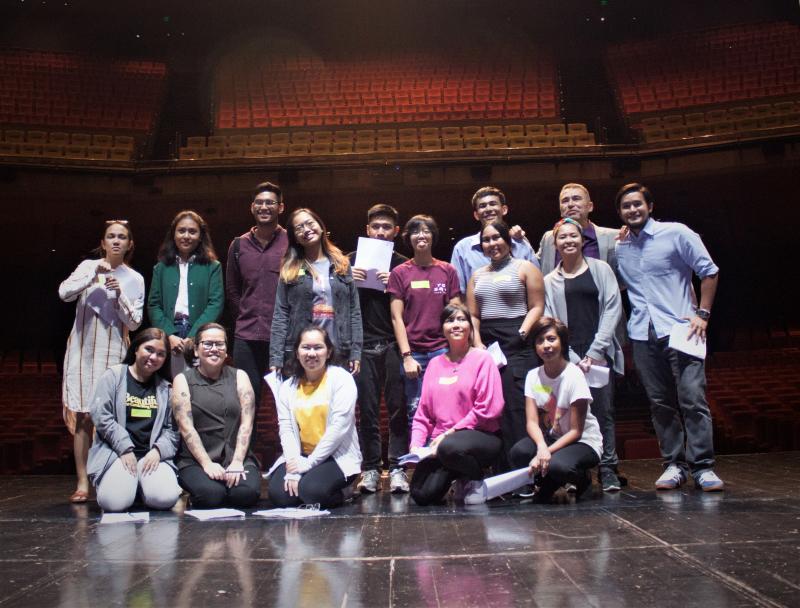 Manila, Philippines--Shakespeare Rose Theatre, produced by Lunchbox Theatrical Productions, recently held its first-ever Shakespeare boot camp at the Theatre at Solaire. This award-winning company from the United Kingdom (UK) makes its international debut in Manila by bringing two classic Shakespeare plays, "Macbeth" and "A Midsummer Night's Dream," to the Filipino audience for a week, from September 17 to 22, 2019.
Manila, Philippines--Shakespeare Rose Theatre, produced by Lunchbox Theatrical Productions, recently held its first-ever Shakespeare boot camp at the Theatre at Solaire. This award-winning company from the United Kingdom (UK) makes its international debut in Manila by bringing two classic Shakespeare plays, "Macbeth" and "A Midsummer Night's Dream," to the Filipino audience for a week, from September 17 to 22, 2019.
The boot camp's goal is to have participants that will spend their day in the life of a Shakespearean actor, which meant they had to analyze and study the script, train, and rehearse, and even look like the part. The first agenda of the day was to show the participants to their respective dressing rooms where they found the schedule of the day's activities, their copies of the script, name tags, as well as their boot camp souvenirs.
When they have settled in, as is indicated on the agenda, they headed up to go inside the theatre and prepare for the lesson about dissecting scenes from Shakespeare's works.
Scene Dissection with Professor Leon Peckson
When it comes to analyzing Shakespeare and understanding his plays, Professor Leon Peckson proved to be the ideal instructor to give the participants a short course for it. Not only did he previously teach Shakespeare and literature at the University of Asia and the Pacific, but he also has his master's degree in Shakespeare and Education from the University of Birmingham's Shakespeare Institute in Stratford-upon-Avon, which had a partnership with the Royal Shakespeare Company.
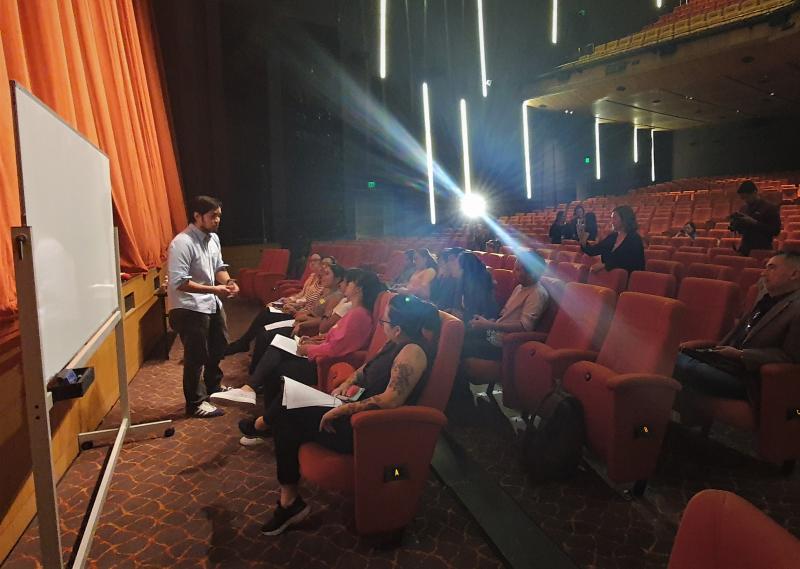 It's no secret that most people deem Shakespeare's works to be daunting and terrifying to study. His plays, having been written hundreds of years ago, gives the idea that his words might be more than difficult to comprehend at present. Most of the time, when thinking of literature in the general sense, there is the notion that everything needs to be deeply read into, like searching for a reason why the author chose a particular color for a setting.
It's no secret that most people deem Shakespeare's works to be daunting and terrifying to study. His plays, having been written hundreds of years ago, gives the idea that his words might be more than difficult to comprehend at present. Most of the time, when thinking of literature in the general sense, there is the notion that everything needs to be deeply read into, like searching for a reason why the author chose a particular color for a setting.
This is what Prof. Leon had to say about taking apart Shakespeare's words and analyzing them: "What happened when I went to the Shakespeare Institute was a little like you have a cadaver on the table, and you start dissecting the cadaver and taking apart the cadaver and looking at every single organ that it has, and in order for that to happen, the cadaver has to be distant and dead. What I found was, I wasn't interested in a body that way, a body dead on a dissecting table. I wanted a body alive with whom I can dance, whose heartbeat I can feel, whose breath I could feel on my neck. And so much of Shakespeare academia is the cadaver on the table, but what happens here in the theatre, with audiences coming into contact with the actors on stage and director's interpretations, what have you, that's the dance. And so, my hope for you, in this little class we're going to have is, you come to the dance. [...] Come and dance with Shakespeare."
For the scene dissection, the class studied Act 1 Scene 7 of "Macbeth." Prof. Leon first shared the context of the passage and explained the events that had led to that scene for the participants to have an idea of what was transpiring. He then divided the scene into four parts to study each one deeper. Every line and every word that Shakespeare uses is essential to the story. He always says what he means and manages to convey inner turmoil with his choice and rhythm of words. Fans of Shakespeare in his era didn't just come to see his plays, they came to hear it. They are the audience in an auditorium. A big part of theater is what the people hear, which are the words that an author uses. And so, as Prof. Leon has shared, what Shakespeare wants the readers and the audience to "sink [their] teeth into and pay a little more attention to is the language. But not language as I say on the dissection table. Living language. The language of the dance." By studying each portion of the text, everyone understood the scene and how it drives the plot and the overall theme of "Macbeth."
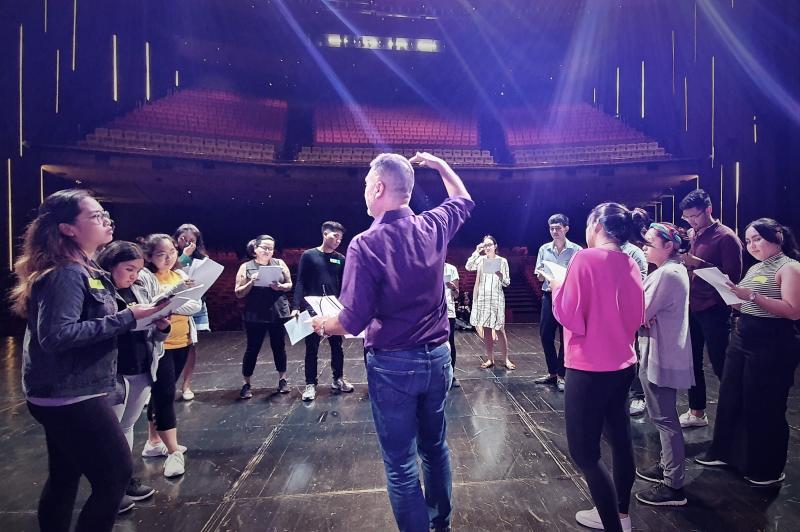 When the participants have grasped how to read Shakespeare's words, they had to move on to the next part of the boot camp, which is knowing how to say them properly. It is not enough for an actor to understand the text; they must learn how to properly convey it, too. In the same manner that musical theater actors can have their versions of singing the same song, Shakespearean actors can also have their interpretations and performances of a similar text.
When the participants have grasped how to read Shakespeare's words, they had to move on to the next part of the boot camp, which is knowing how to say them properly. It is not enough for an actor to understand the text; they must learn how to properly convey it, too. In the same manner that musical theater actors can have their versions of singing the same song, Shakespearean actors can also have their interpretations and performances of a similar text.
Scene Rehearsals with Director Jaime del Mundo
To help the participants with their lines, they needed a director who is an expert in Shakespeare and knew what he was talking about. This is where multi-awarded director Jaime del Mundo comes in. At a young age, he already read many of Shakespeare's words simply for fun. He has a lot of owned copies of various Shakespeare plays and has years of experience in analyzing his works. He also believes that plays aren't necessarily entertainment. "I'm one of the few who doesn't believe theater is entertainment, but I do believe theater is entertaining, and that's a difference." What separates theater from different forms of art is the willingness of an audience to suspend their disbelief. It's not just simply believing that everything is true; it's not not believing.
To give a short intro before delving into the rehearsals, Director Jamie found it interesting to read "Quoting Shakespeare" by Bernard Levin where the passage emphasized how great of an impact that Shakespeare had in the English language. Words and phrases that we use until today are due to his creative genius, and we may be quoting Shakespeare more often than we realize. He concluded his brief introduction and the participants were then asked to go on stage with their scripts and pencil in hand where they will be training and rehearsing as Shakespearean actors.
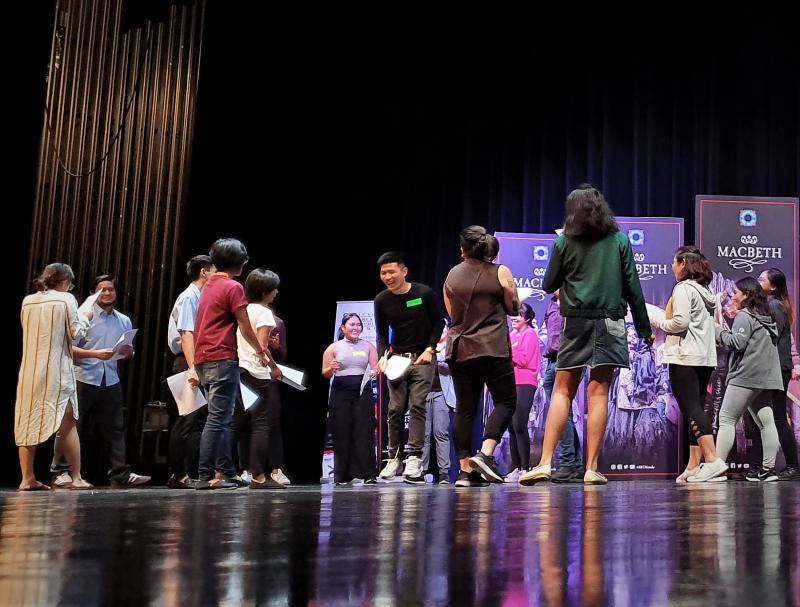 The first passage that was studied was the prologue of "Henry V." With everyone in a circle, each one had to recite a part of the passage until they came across a punctuation mark, which signaled the next person's turn. Director Jaime explained what the lines meant and what the context was to help the participants understand what it was that they were saying. When the passage was done, he had everyone recite it again but in iambic pentameter, the rhythm that Shakespeare followed in this text. Shakespeare preferred it because the rhythm made it easier for actors to memorize and for the audience to understand the words. It didn't come easy because, oftentimes, Shakespeare deliberately chose to break the rules to give emphasis.
The first passage that was studied was the prologue of "Henry V." With everyone in a circle, each one had to recite a part of the passage until they came across a punctuation mark, which signaled the next person's turn. Director Jaime explained what the lines meant and what the context was to help the participants understand what it was that they were saying. When the passage was done, he had everyone recite it again but in iambic pentameter, the rhythm that Shakespeare followed in this text. Shakespeare preferred it because the rhythm made it easier for actors to memorize and for the audience to understand the words. It didn't come easy because, oftentimes, Shakespeare deliberately chose to break the rules to give emphasis.
After much practice with "Henry V," they moved on to passages from the Act 1 Scene 1 of "A Midsummer Night's Dream." Director Jaime first had them read Theseus and Hippolyta's exchange together as a group and then chose two volunteers to read their respective lines. There was an activity where the two volunteers, who had a considerable distance between them, had to meet in the middle of the stage while saying their lines. The catch is: three men try and hold Theseus back and four women try to hold Hippolyta back. The exercise was meant to help actors physicalize the emotions needed in the scene such as desperation, need, and perseverance to reach each other's arms. True enough, it made quite the difference as the actors' voices and physical demeanor had more character after the short exercise.
The last passage they delved into was Egeus' monologue shortly after Theseus and Hippolyta's exchange. The participants went through the same process in reading the lines out loud. For the activity for this piece, there was a need for only one volunteer who will recite the lines. There were two chairs about 15 feet apart and Egeus had to recite the lines until a punctuation mark, after which he had to walk over to the next chair to read again, and so on. This last exercise was to help the actors read more into each separate line and phrase and give meaning and intention into each one.
Two hours felt so short when everyone's having a good time just getting into the groove of speaking Shakespeare's words. It was an unforgettable experience to get to recite the words of the greatest poet that ever lived in a world-class theatre such as the Theater at Solaire. It was then time to shake off the iambic pentameter rhythm and head over to the dressing rooms where the participants will be taught how to do three different makeup designs: a fairy look in "A Midsummer Night's Dream," a bloody face from "Macbeth," and a common old-age makeup.
 Character Transformation with Myrene Santos
Character Transformation with Myrene Santos
It was time to get into character, and who better to show the participants what to do than Myrene Santos? She is a talented hair and makeup designer and artist in theater and musicals. She has worked with Lunchbox Theatrical Productions for a long time. Her first time with them was back in 2014 when they did "Wicked." She's done a lot of work on "The Lion King" and "The Phantom of the Opera," too, and even shared her stories on "greening" Elphaba in "Wicked." She also worked on tons of local productions.
Myrene helps actors get into character through makeup. Before she was a makeup artist and designer, she had experienced being an actor and it helped her anticipate the needs as well as understand theater from a different perspective. While other artists are more into beauty makeup, she says that theater makeup is where she feels most at home. She loves how she can get creative and practice many different looks aside from the usual beauty looks that she can also do.
For the day's lessons, she asked for three volunteers with which to demonstrate the three different makeup looks. The first design that she showed was the bloody look from "Macbeth." It involved a lot of dirt makeup as the play involved lots of fighting and being in the soil. Myrene explained that being "dirty" has to look genuine and so the makeup shouldn't be too symmetrical and perfect. What took everyone's interest was the fake blood that was used. She showed how it was made using corn syrup, food coloring, and cornstarch or Jell-O. Corn syrup is often used in fake blood because it has the same consistency as real blood. The cornstarch or Jell-O is for the "clumping" of blood where the wound is. Blood makeup doesn't just require red food coloring as there are lots of shades needed to execute the real look. She shared that she also uses deep purple shades for blood that is closest to the wound.
Most people think makeup is just simple and easy to do, but makeup artists need to study a lot about the human body to show what a character is going through in a scene. When it comes to wounds, they need to confirm first if it damaged a vein or an artery as it requires different shades of redness. Knowing about the anatomy isn't strictly just for blood makeup. It is also applicable to other kinds of looks including the next one that she demonstrated--the old-age look.
She explained that the look requires knowledge of how the skin tends to get loose and droop as well as the parts of the face where it does that. Highlights and shadows play a huge part in this kind of makeup because they make lines in the faces where there aren't. Shows that use this makeup are those that take place in a span of a long time where the actor should gradually age. However, shows that simply have older characters do choose to cast older actors.
The last look was a fairy from "A Midsummer Night's Dream." To those who don't know yet, the fairies in that play aren't the typical bright, bubbly, and colorful fairies one would imagine. They are magical and woodland creatures with costumes that help them hide in the forest. The look that Myrene demonstrated needed the volunteer to be covered with a black cream-like foundation in the upper half of the face. To achieve the galaxy look, she used a brush with white cream that was "sprayed" on the face.
The three makeup looks by Myrene surely helped the participants to internalize being a Shakespearean actor. Though it was a short course on a complex art, everyone understood that makeup requires a lot of knowledge, creativity, and expertise. It doesn't just help actors to get into character but it also helps the audience get transported into the scene and get absorbed in what they see before them. As with any other department in any production, the Makeup Department is extremely valuable.
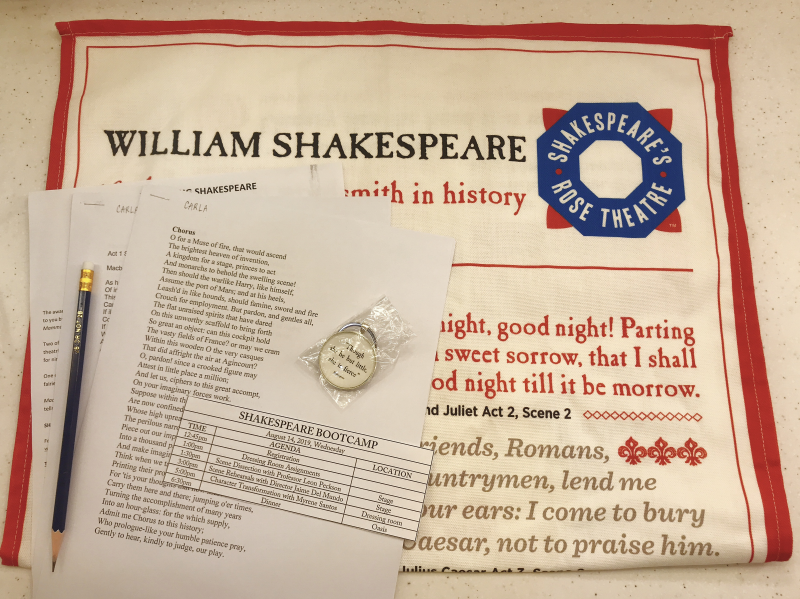 By this time, the participants have dissected the text, recited the script, and transformed into different characters, which marked the end of the Shakespeare boot camp. It was a very elaborate, thorough, and unforgettable event that taught everyone new knowledge when it comes to theater and Shakespeare. The Shakespeare Rose Theatre and Lunchbox Theatrical Productions had a very successful first boot camp, and hopefully, there'll be many more in the future.
By this time, the participants have dissected the text, recited the script, and transformed into different characters, which marked the end of the Shakespeare boot camp. It was a very elaborate, thorough, and unforgettable event that taught everyone new knowledge when it comes to theater and Shakespeare. The Shakespeare Rose Theatre and Lunchbox Theatrical Productions had a very successful first boot camp, and hopefully, there'll be many more in the future.
The overall involvement with the boot camp makes it even more exciting to watch for the Shakespeare Rose Theatre's shows this coming September. Some might need still be a bit hesitant watching a play they're not sure they'll like, but no matter what show it is, it will turn out to be a memorable experience. "Theater makes you smarter. That is my own fact, but yes it does. [...] You cannot help but become smarter by being in the theater. Why is that? Because good theater needs to engage you," said Director Jaime. And although the Shakespearean crash course surely helped in understanding the Bard, it is more than okay to come and watch the shows without previous knowledge about the play whatsoever because that's usually how it went back in the Elizabethan era. There is no problem in watching his plays cold, and according to Professor Leon, "Shakespeare wouldn't have wanted it any other way."
Shakespeare Rose Theatre's international debut presents to the Philippine audience a unique opportunity to witness Shakespeare's most iconic and enjoyable comedy "A Midsummer Night's Dream" and bloody action-packed tale "Macbeth." Make sure to catch the shows in their limited one-week run this September 17-22, 2019, at the Theatre at Solaire in Paranaque. Come and dance with Shakespeare!
Buy tickets at TicketWorld.com.ph.
Photos: Carla Delgado, Lunchbox Theatrical Productions
Comments
Videos


